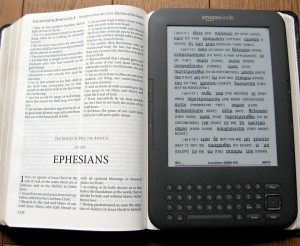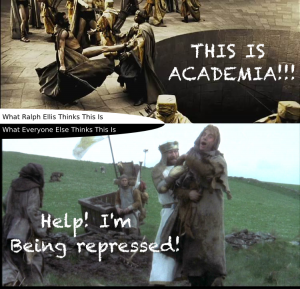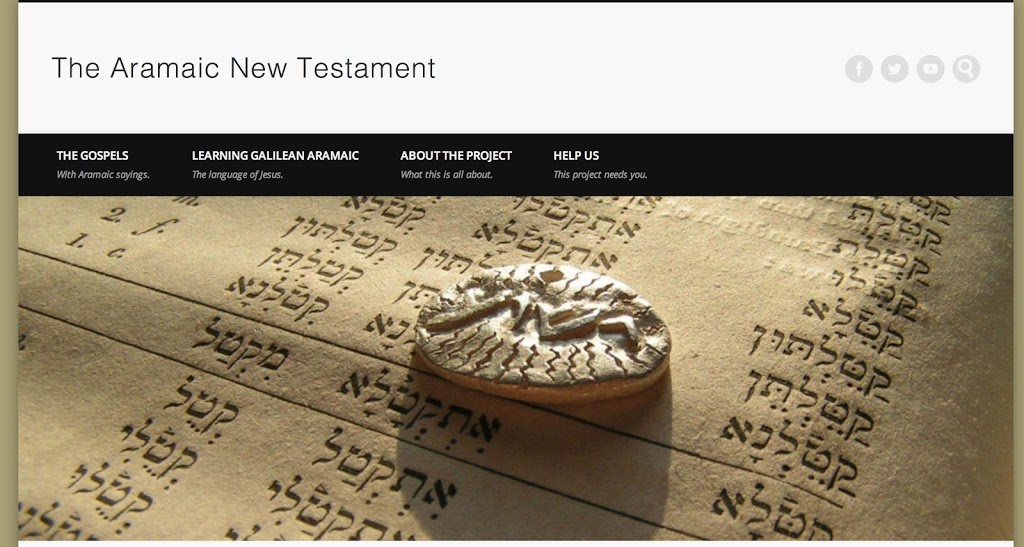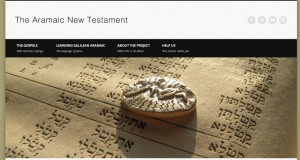I usually don’t discuss new books here on The Aramaic Blog… but sometimes a work inspires something within me that I cannot contain. One of those books is “King Jesus of Edessa” by Ralph Ellis… and what it inspires (in me) is a bad nervous tic.
It’s the conspiracy to end all conspiracies about who the historical Jesus was. Ralph Ellis claims that he was King “Izas Manu” a patchwork figure that he seems to have cobbled together from a half dozen historical figures spanning two kingdoms (which he assumes are the same) and several hundred years.
Tom Verenna, I believe, puts it best:
[Ellis is] basically suggesting that at least four historical kings (Izates bar Monobaz, Abgar V the Black, Abgar Ma’nu VI, and Abgar bar Manu VIII the Great) from two distinct provinces with separate kings (Edessa in the province of Osroene vs. Arbela in the province of Adiabene) are one and the same person and place respectively. [He seems] to completely ignore the fact that both of these places exist miles apart
Like Frankenstein’s monster, sewn together from bits of unrelated dead people, I doubt it would work in real life no matter how many times it was struck by lightning.
However, allow me stick to something which is my forté, and that is ancient languages. As Tom has pointed out, much of Ellis’ argument is based upon how certain words sound similarly, regardless of what their actual etymology is, and there are a number of elementary mistakes. Allow me to concur with the following points:
- There is no relation between Jesus (from the Aramaic ישוע /yeshua’/) and Izas/Izates (from the Persian ایزد /’izad/). The only similarity is in their English transliteration.
- Barabbas comes from the Aramaic בר–אבא /bar-abba/, not the Latin “barbar”. This etymology is not in dispute.
- Manu (?) provided it is from Monobaz does not share etymological origins with the Hebrew אמנואל /immanuel/, otherwise I’m not sure where he pulled this one from.
- Ellis has made very elementary spelling mistakes in Greek, not using a proper final sigma ς where it is required. There are a number of examples of this in the free preview of his book. It would be like spelling דין as דינ or עם as עמ. It’s blatantly incorrect.
- The claim that Adiabene means “Sons of Addai” (I assume ܐܕܝ ܒܢܝ /addai b’ney/) makes a fundamental mistake that anyone who studies Aramaic of any stripe would find rather embarrassing. A noun in the construct form must precede the noun it modifies (like in ܒܢܝ ܐܝܣܪܐܝܠ /b’ney israel/ = “Sons of Israel”, or בני קרתא /b’ney qarta/ = “sons of the city” = “townsfolk”). Adiabene comes from ܚܕܝܐܒ /hadiyav/. There is no similarity between ܚܕܝܐܒ /hadiyav/ and ܒܢܝ ܐܕܝ /b’ney addai/.
- The progression of Judas into Addai is a horrible “Edenic two-step.” Judas comes from יהודה /yehuda/, and יהודה and אדי could not perturb from one to the other as he proposes. One cannot simply ignore established etymology.
However, all of this is really to be expected, in my opinion, as Ellis is admittedly proud that he doesn’t play by the conventional rules of academia; however, because of this, I’m not quite sure that anyone could call his book or his thesis “scholarship” without equivocating.
Then again what do I know? I just translate for a living… 🙂
Peace,
-Steve
As you can probably note, there are a large number of comments I removed below. In essence, Ralph Ellis has been commenting on this article under the monicker “Unknown” and we had an interesting — but sadly fruitless — discussion.
He does not operate within any acceptable or cogent framework, and his reasoning and conclusions are categorically haphazard, uncritical, and flawed; they are far from the margin and are grasping to hang on to the fringe. For details, you can read the highlights of it here; I’m not keeping it up on my blog.
The final straw was that he was very uncivil and insulting. Among other things he referred to Tom Verenna as a “fraud,” “stupid,” a “retard,” a “troll,” as having a “self-congratulatory mafia,” and after I asked him politely to stop, obliquely referred to him as a bastard (he was “questioning his paternity”). These are not the words of man with decorum. I will not tolerate such speech in my comments, nor will I tolerate Ellis here any longer.
If anyone has any doubt as to the veracity or sincerity of my statements, I have the entire conversation archived and transcripts are available upon request. In the future I might even publish some excerpts to outline the most absurd of his arguments, but for now we’ll see.
Peace,
-Steve
Apparently now Ellis is taking it upon himself to take a break from smearing Tom, and took a stab at smearing me on the blogs of friends and colleagues. Since I have better things at this point in time to do (like make fun info-graphics) I will express what the general consensus is about this entire debacle amongst Bibliobloggers as of 10:30 EST this morning:
Peace,
-Steve
Kindle doesn’t support Hebrew and Greek?
 |
| Greek |
 |
| Hebrew |
These ain’t jpegs. Note the proper final forms. These are CSS fonts.
UPDATE: In fact there’s an entire website and free utility dedicated to properly displaying Hebrew on Kindle. Allow me to give them a plug here:
There are plenty of screenshots to see there.
Peace,
-Steve







